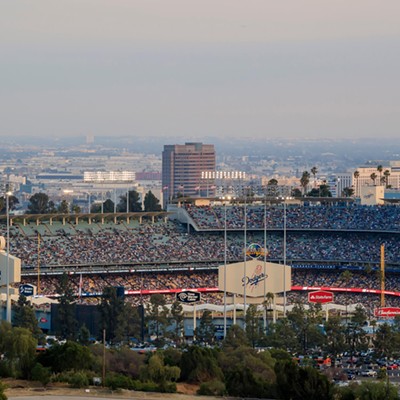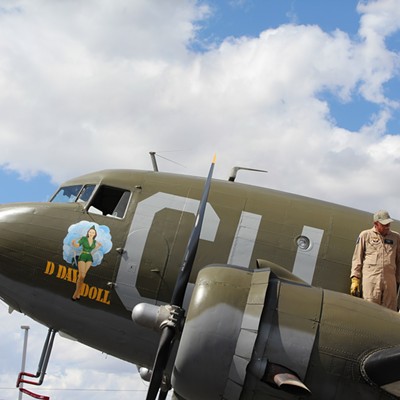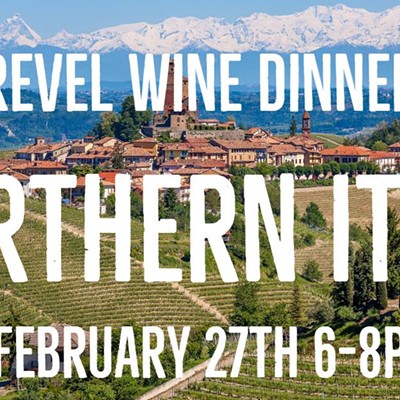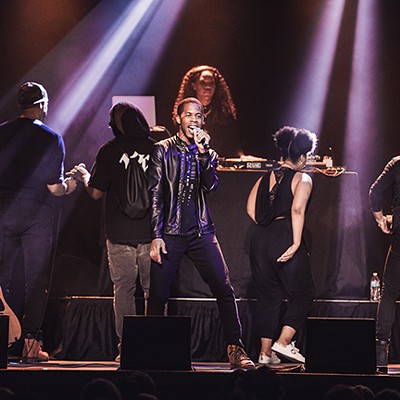April 4 marks the 40th anniversary of his assassination. Many Tucsonans will look back at that day--some in muted anger, others in tearful admiration, and a few in the belief that, at the time of his death, he was in the process of being marginalized and swept aside by forces more powerful and more primal, largely because of his steadfast devotion to nonviolence.
It is sad, but true, that many school kids know little of Martin Luther King Jr., other than that he was assassinated and that they get this weird day off from school only a couple of weeks after getting back from Christmas break. But such is not the case for those whose lives overlapped that of King. The day of his death is one of three or four memories seared into their brains, along with the deaths of John and Bobby Kennedy, and perhaps (this being America and all) that of Elvis Presley.
King was in Memphis in support of striking black sanitation workers, who were protesting pay discrepancies and unequal treatment. He had led a march a few days earlier that had degenerated into violence, much to his dismay. While his support was still enormous, and his ability to draw large crowds was still intact, he found himself being flanked by groups like the Black Panthers and other young African Americans who found his stance on nonviolence to be, at the very least, quaint.
Stridency was becoming the norm. Race riots had erupted in several large U.S. cities in previous years--in New York in 1964, in the Watts section of Los Angeles in 1965, and then in Detroit, Cleveland and other cities. King never wavered in his message, but those who knew him said that he understood the fury of Malcolm X (who had been assassinated in 1965 by henchmen of Elijah Muhammad, whose Nation of Islam had been championed by Malcolm before he began to drift away from them) and the sense of urgency exhibited by many young black people.
King had delivered a rousing speech the night before his death; it was the famous "Mountaintop" speech that concluded with:
It really doesn't matter to me now because I've been to the mountaintop. And I don't mind. I would like to live a long life; longevity has its place. But I'm not concerned about that right now. I just want to do God's will. And He's allowed me to go up to the mountain. And I've looked over, and I've seen the Promised Land. I may not get there with you, but I want you to know tonight that we, as a people, will get to the Promised Land. And I'm so happy tonight; I'm not worrying about anything. I'm not fearing any man. Mine eyes have seen the glory of the coming of the Lord!
King was making plans to lead another march that coming weekend. He and several of his friends, including Ralph Abernathy and a young Jesse Jackson, had checked into the Lorraine Motel and were getting ready to go out to dinner. (Whenever he was in Memphis, King stayed in the rather seedy motel in the downtown area, which, in earlier years, had served as a meeting place for jam sessions involving members of Booker T. and the MGs, who provided the backup music for Stax/Volt classics like "Soul Man" and "In the Midnight Hour.")
At 6:01 p.m.--not "early morning, April 4" as Bono croons in U2's "Pride (in the Name of Love)"--a single shot rang out. A high-powered bullet fired from an adjacent building struck Martin Luther King in the right jaw, traveled along the jaw line, then severed his spine before lodging in his shoulder. Ralph Abernathy ran up to his crumpled body and cradled King, saying, "Martin, it's me, Ralph." The bullet had done terrible and mortal damage. Witnesses say that King had bent over just as the bullet was being fired, and speculation is that it had been aimed at his torso. Whatever the case, he was dying.
He was rushed to a hospital but was declared dead shortly after 7 p.m., local time.
The news traveled fast.
Longtime Tucsonan Morris Brite remembers the day all too clearly. Brite found himself in Boston that day.
It was just another day, really. But then, when they (made the announcement), it was like somebody turned on a switch. People came out in the streets, and they were screaming and crying. There was some fighting and windows being broken, but it wasn't way out of hand. I saw somebody throw a brick through a window, and I remember thinking to myself, "He stood for nonviolence; this isn't how people should react," but it was no use. People had a whole lot of anger built up.
People who have never been in a situation like that don't know what it's like. The emotion is so powerful. It's so easy to get caught up in it. I've heard people say that it's like being at a (sporting event) or something where the crowd is really into it, and you get swept up, but it's more basic and a lot stronger than that.
But it wasn't a full-blown riot. People were milling around, kind of waiting for something to happen.
The new mayor of Boston, Kevin White, had only been in office for several months. He somehow found the nerve to avoid sending large units of police into Roxbury and other parts of town with large black populations. Instead, White urged black merchants and clergymen to try to keep a lid on things, but feared that widespread violence would erupt the next day.
Complicating matters was the fact that soul-music legend James Brown was scheduled to perform in Boston the next day. Brown was an icon on the forefront of the black-power movement. His edgy song, "Say It Loud! (I'm Black and I'm Proud!)," recorded and released a few months after MLK's death, became nothing short of an anthem in the black community. Nevertheless, Brown rejected violence, and once famously told black militant H. Rap Brown, "I'm not going to tell anybody to pick up a gun."
Kevin White initially wanted to cancel Brown's concert for fear that it would gather thousands of young blacks in the downtown area and perhaps touch off a riot. But White and his top aide, a young Barney Frank, hit on another idea: The concert would go on and would be televised live throughout the Boston area by the local fledgling PBS station, WGBH. (Reportedly, neither White nor Frank knew who James Brown was, and kept referring to him as "James Washington.")
The concert went on as scheduled. Only a couple thousand people showed up in person, but untold numbers of people stayed home to watch it on TV. Peter Wolf, lead singer of the J. Geils Band, recalled driving down the eerily quiet streets that night and looking in people's windows to see all of the TVs tuned to the concert. Brown put on his typical dynamite show, and once, when the crowd tried to rush the stage, he calmly talked them back into their seats.
"It was amazing," recalls Brite. "He had such power, such charisma."
While more than 100 U.S. cities had riots following the murder of Martin Luther King, Boston was spared. After James Brown died on Christmas day in 2006, the Boston Globe ran a piece remembering his role in calming Boston after King's death, and an upcoming TV movie focuses on the topic. It's called The Night James Brown Saved Boston.
In 1968, Raul Nido was a track star at Sunnyside High School; he is now the school's principal.
I remember thinking, "What is wrong with this world?" Then, two months later, Bobby Kennedy got shot and killed. It was a very troubling time. I wondered why anybody would try to do anything for other people, especially if you could lose your life over it.
Tucson has never had a large African-American population. Even today, it hovers in the 2 percent range, while in several major American cities, it's at 50 percent or even higher.
There weren't a lot of African Americans at Sunnyside, or in Tucson in general. We weren't afraid of big riots or anything, but it really made a lot of people sad. Over the years, there has been a certain underlying animosity between some Hispanics and some African Americans. But I don't remember anything about that day and time other than everybody feeling bad. He was a good man trying to do good things. It made no sense. I wondered why anybody would do that.
James Earl Ray had escaped from prison in Missouri the year before and had bounced around North America, spending time in both Mexico and Canada in the year leading up to the King assassination. An open and avowed racist, Ray's motivation will never be known, but it almost certainly involved a long-rumored bounty on King's head put up by Southern racists and/or the very real possibility that being tried in a Southern court for the killing of a black man would either result in a light sentence, after which he could cash in on his infamy, or an outright acquittal.
Conspiracy theories abound, many involving the FBI. To be sure, chief fed J. Edgar Hoover despised King, but it's highly unlikely that even he had the stones (under that pretty red dress he wore on Saturday nights) to assassinate a Nobel Prize winner and one of the most recognizable people in the world at that time.
Much was made of the fact that Ray quickly made his way to Canada and then England after the shooting. (Just because somebody is racist doesn't mean that he can't function in the everyday world.) At the time, Canada was a haven for people on the run, and fake documents could be procured for very little money.
(I remember seeing Truman Capote on a late-night talk show discussing the case. I had read In Cold Blood, mostly because I had been told not to, at a young age, and I envisioned Capote to be this hulking monster, somewhere in the mode of a super-sized Norman Mailer. When Capote walked across the stage and then opened his mouth to speak, it wasn't what I had expected. Capote was impassioned and wanted very badly for King's killer to be caught. He carefully outlined Ray's movements and even spoke of Ray's alias, Eric Starvo Galt.)
Ray went from London to Lisbon, but then returned to London. He told people that he wanted to make his way to South Africa, where he could join up with a white mercenary band in hopes of avoiding extradition to the United States should his identity ever be discovered. He was on his way to Brussels when he was arrested at Heathrow Airport in London, using documents with the name of Ramon George Sneyd.
It was two days after Bobby Kennedy had died.
Gerald Birin was 11 years old and living in South Africa when King was killed. Now an international businessman who lives in Tucson, he was surprised to learn about the connection between Ray and South Africa. He's not exactly sure when he learned of King's death, but he's certain that it wasn't right when it happened.
South Africa was under apartheid at the time, and the government kept pretty tight control of the news. I don't think they would have wanted that story to get out and get a lot of attention. I was a good student, and I paid attention, but I don't recall ever hearing that story on the news.
Retired Tucson City Fire Department member Phil Gibson heard the news right away in his home town of Buffalo, New York.
It was early evening in Buffalo, but by (this) time of year, it's still light out pretty late. I don't recall exactly how I heard, whether it was on the radio or from another person, but my first thought was to get home as quickly as I could. I knew there was going to be trouble.
There were always knuckleheads who would look for an excuse to start things, and to them, this was a big excuse. Nobody cared about Martin's message. They were just yelling and screaming and talking about how they were going to get even for what happened.
My parents made me get in the house, and we barricaded ourselves in. I told my mom that since we were black--I might have still used the word "negro" back then--we had nothing to fear from the people in the neighborhood. (Obviously, the police were another matter.) But she said that when people start acting all crazy like that, they were all scary.
I don't think I went to school the next day, but it died down pretty quickly. The rioting and looting was pretty much confined to the black neighborhoods, which is usually the case. One weird thing I remember is that they left the churches alone. Even the Catholic Church was protected by people in the neighborhoods.
After graduating high school, Gibson joined the Air Force. He eventually found himself stationed at Davis-Monthan Air Force Base and has lived in Tucson ever since.
He has made sure that his children have learned of the struggles and ultimate sacrifice made by Martin Luther King.
Kim Kunnie was in grade school at a Catholic school in Denver. She was out on the playground playing tetherball. She remembers seeing the nuns and the lay teachers talking excitedly before several of them began to cry. One of the adults--she's not sure whether it was a nun or a lay teacher--told her that Martin Luther King had been killed, and that everybody would have to come in off the playground.
I told her that I would have to take the tetherball down first. I couldn't leave it outside. I've always wondered why I reacted that way.
While King's assassination had a profound impact on many people's lives, for some, it wasn't the most intense pain of that kind they ever experienced. Renaissance man Lenny Lowndes--who has served in the military, taught science and, a few years back, was even Southern Arizona High School Tennis Coach of the Year--has always been "a Malcolm guy."
Malcolm X spoke to me, right into my heart and my head. He was rough, and not everybody could take his words. He said what you needed to hear, not what you wanted to hear. I loved him; I've always wondered what would have happened if he had lived, what kind of impact he would have had on black people, and America in general.
My friend and I were crossing the bridge, heading to the Audubon Ballroom (in New York City) to hear him speak the day he was killed. We got across the bridge and were nearing the ballroom when people busted out into the street, screaming, "They shot Malcolm! They shot Malcolm!"
We turned around and headed back across the bridge. I remember feeling an emptiness that day that can't be put into words. It wasn't just all the things he had done. He straightened himself out in prison. He set himself up to live up to high standards and expected others to follow suit. He was an outstanding example, and then he had that conversion after visiting Mecca.
It's obvious that he was way too powerful for Elijah Muhammad. What a waste. It wasn't just for what he had done; it was for all the things he wasn't going to have a chance to do in the future.
When Martin Luther King got killed, I was in the military, stationed in Lompoc, Calif. I always kept a shotgun in my car for when I was off the base. It was California, but it wasn't paradise. There were crazy people and racists everywhere.
I remember that my first reaction after hearing that Martin got shot was to walk out to my car and make sure that my shotgun was loaded.
Driving home from swim-team practice, then-Catalina High student Bruce Ash first heard the news on the car radio. He went home and watched the reports on the TV. There weren't any cable outlets back then, but all three networks were covering the story nonstop.
Now a Republican Party national committeeman, Ash has never developed the rose-colored vision with which many people look back at the 1960s.
It was an ugly time. An ugly time. There was just so much violence and madness. Just think that in that short period of time, we lost President Kennedy, Malcolm X, Martin Luther King and Bobby Kennedy. What a waste! Then, a couple of years after that, the students were killed at Kent State. I know that was in (May 1970), but it put an exclamation point on the decade.
I've never understood people who look back at the 1960s as this great time. The music was great, but the times were often horrible. We put a man on the moon, but we couldn't stop hating each other, and couldn't keep our leaders from being killed. I often wonder what this country would be like if those four men hadn't been killed.
It was just an ugly time.














